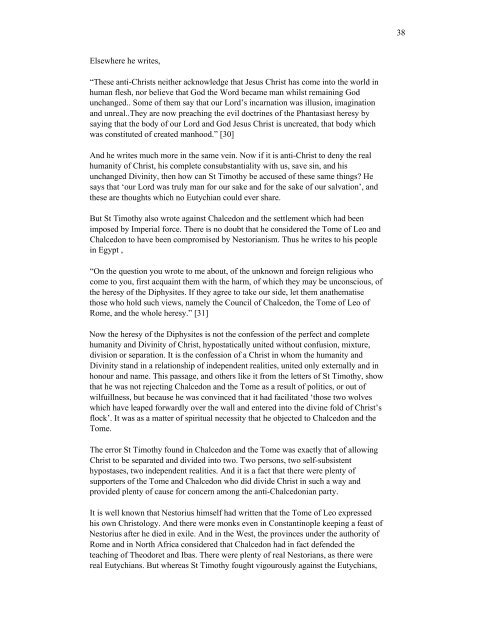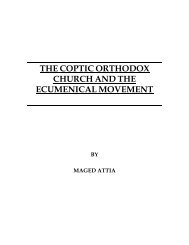Coptic interpretations of the Fourth Ecumenical Council - Saint Mina ...
Coptic interpretations of the Fourth Ecumenical Council - Saint Mina ...
Coptic interpretations of the Fourth Ecumenical Council - Saint Mina ...
Create successful ePaper yourself
Turn your PDF publications into a flip-book with our unique Google optimized e-Paper software.
Elsewhere he writes,<br />
“These anti-Christs nei<strong>the</strong>r acknowledge that Jesus Christ has come into <strong>the</strong> world in<br />
human flesh, nor believe that God <strong>the</strong> Word became man whilst remaining God<br />
unchanged.. Some <strong>of</strong> <strong>the</strong>m say that our Lord’s incarnation was illusion, imagination<br />
and unreal..They are now preaching <strong>the</strong> evil doctrines <strong>of</strong> <strong>the</strong> Phantasiast heresy by<br />
saying that <strong>the</strong> body <strong>of</strong> our Lord and God Jesus Christ is uncreated, that body which<br />
was constituted <strong>of</strong> created manhood.” [30]<br />
And he writes much more in <strong>the</strong> same vein. Now if it is anti-Christ to deny <strong>the</strong> real<br />
humanity <strong>of</strong> Christ, his complete consubstantiality with us, save sin, and his<br />
unchanged Divinity, <strong>the</strong>n how can St Timothy be accused <strong>of</strong> <strong>the</strong>se same things? He<br />
says that ‘our Lord was truly man for our sake and for <strong>the</strong> sake <strong>of</strong> our salvation’, and<br />
<strong>the</strong>se are thoughts which no Eutychian could ever share.<br />
But St Timothy also wrote against Chalcedon and <strong>the</strong> settlement which had been<br />
imposed by Imperial force. There is no doubt that he considered <strong>the</strong> Tome <strong>of</strong> Leo and<br />
Chalcedon to have been compromised by Nestorianism. Thus he writes to his people<br />
in Egypt ,<br />
“On <strong>the</strong> question you wrote to me about, <strong>of</strong> <strong>the</strong> unknown and foreign religious who<br />
come to you, first acquaint <strong>the</strong>m with <strong>the</strong> harm, <strong>of</strong> which <strong>the</strong>y may be unconscious, <strong>of</strong><br />
<strong>the</strong> heresy <strong>of</strong> <strong>the</strong> Diphysites. If <strong>the</strong>y agree to take our side, let <strong>the</strong>m ana<strong>the</strong>matise<br />
those who hold such views, namely <strong>the</strong> <strong>Council</strong> <strong>of</strong> Chalcedon, <strong>the</strong> Tome <strong>of</strong> Leo <strong>of</strong><br />
Rome, and <strong>the</strong> whole heresy.” [31]<br />
Now <strong>the</strong> heresy <strong>of</strong> <strong>the</strong> Diphysites is not <strong>the</strong> confession <strong>of</strong> <strong>the</strong> perfect and complete<br />
humanity and Divinity <strong>of</strong> Christ, hypostatically united without confusion, mixture,<br />
division or separation. It is <strong>the</strong> confession <strong>of</strong> a Christ in whom <strong>the</strong> humanity and<br />
Divinity stand in a relationship <strong>of</strong> independent realities, united only externally and in<br />
honour and name. This passage, and o<strong>the</strong>rs like it from <strong>the</strong> letters <strong>of</strong> St Timothy, show<br />
that he was not rejecting Chalcedon and <strong>the</strong> Tome as a result <strong>of</strong> politics, or out <strong>of</strong><br />
wilfuillness, but because he was convinced that it had facilitated ‘those two wolves<br />
which have leaped forwardly over <strong>the</strong> wall and entered into <strong>the</strong> divine fold <strong>of</strong> Christ’s<br />
flock’. It was as a matter <strong>of</strong> spiritual necessity that he objected to Chalcedon and <strong>the</strong><br />
Tome.<br />
The error St Timothy found in Chalcedon and <strong>the</strong> Tome was exactly that <strong>of</strong> allowing<br />
Christ to be separated and divided into two. Two persons, two self-subsistent<br />
hypostases, two independent realities. And it is a fact that <strong>the</strong>re were plenty <strong>of</strong><br />
supporters <strong>of</strong> <strong>the</strong> Tome and Chalcedon who did divide Christ in such a way and<br />
provided plenty <strong>of</strong> cause for concern among <strong>the</strong> anti-Chalcedonian party.<br />
It is well known that Nestorius himself had written that <strong>the</strong> Tome <strong>of</strong> Leo expressed<br />
his own Christology. And <strong>the</strong>re were monks even in Constantinople keeping a feast <strong>of</strong><br />
Nestorius after he died in exile. And in <strong>the</strong> West, <strong>the</strong> provinces under <strong>the</strong> authority <strong>of</strong><br />
Rome and in North Africa considered that Chalcedon had in fact defended <strong>the</strong><br />
teaching <strong>of</strong> Theodoret and Ibas. There were plenty <strong>of</strong> real Nestorians, as <strong>the</strong>re were<br />
real Eutychians. But whereas St Timothy fought vigourously against <strong>the</strong> Eutychians,<br />
38








